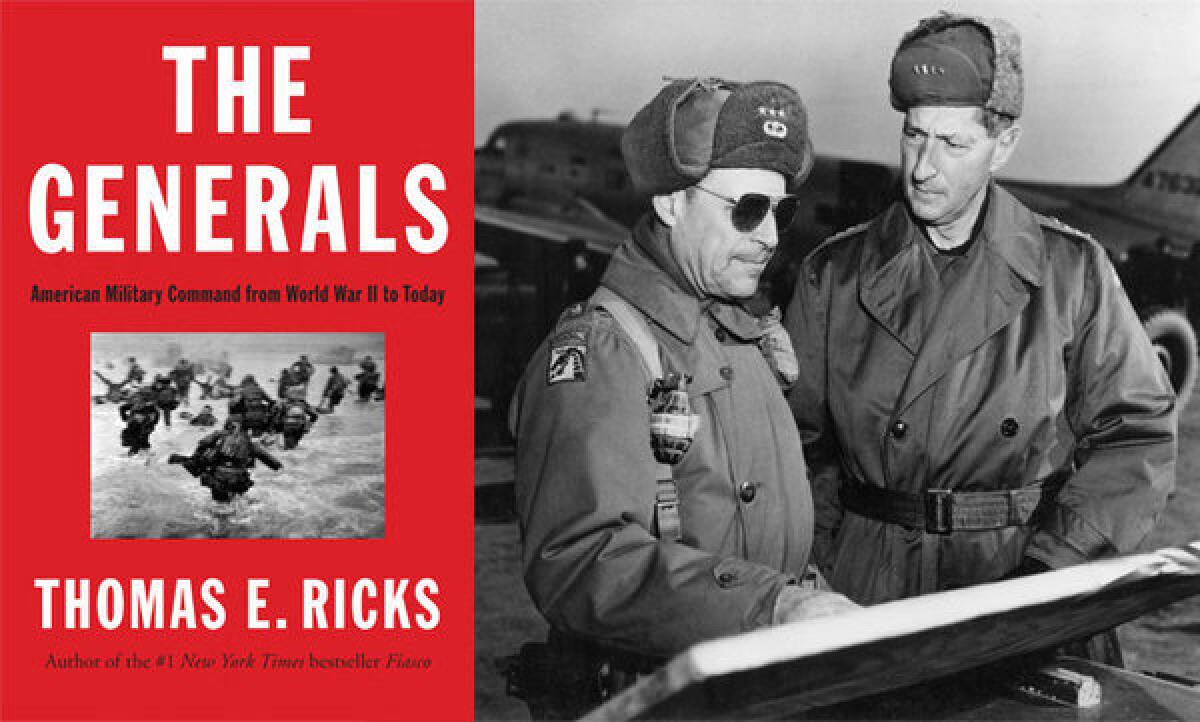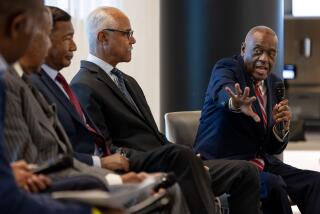Army leaders are reviewed in ‘The Generals’

The Generals
American Military Command from World War II to Today
Thomas E. Ricks
Penguin Press: 556 pp., $32.95
Deep in his impressive, disturbing study of U.S. Army leadership, “The Generals: American Military Command From World War II to Today,” Thomas E. Ricks offers his explanation of why the Iraq war seemed to spiral out of control even after Saddam Hussein was toppled and his army defeated.
The fault was not with the U.S. Army’s rank and file, Ricks concludes.
“It was a well-trained, professional, competent force,” he writes. “But the soldiers were often better at their tasks than the generals who were leading them were at theirs. In Iraq, the U.S. Army would illustrate the danger of viewing war too narrowly.”
A former military beat reporter at the Washington Post and Wall Street Journal, Ricks is swinging for the fences in “The Generals,” analyzing the performance of generals and the civilian leaders who oversee them from Pearl Harbor to Iraq and Afghanistan.
He remembers the slam once used to describe the British army as “lions led by donkeys.”
His conclusions are stark, fact-based and strongly argued: The U.S. Army is often led by generals who are masterful at combat tactics, at converging battalions on an agreed-upon enemy target, but woefully inept at recognizing changes in the battlefield, like the emergence of an insurgency in Iraq or the reemergence of the Taliban in Afghanistan.
In Panama in 1989, Iraq in 1991 and 2003 and Afghanistan in 2001, “Army generals would lead swift attacks against enemy forces yet do so without a notion of what to do the day after their initial triumph, and in fact believing that it was not their job to consider the question.”
Ricks is not reluctant to name names, among them Gen. Tommy Franks, who led U.S. forces in Afghanistan and then Iraq, and Franks’ successor in Iraq, Lt. Gen. Ricardo Sanchez.
“Most generals, at worst, get the opportunity to lose one war,” Ricks writes. “Franks bungled two in just three years.”
Ricks blames Franks, “that most graceless sort of leader, both dull and arrogant,” for blowing an opportunity to kill or capture Osama bin Laden when he was cornered in the Tora Bora mountains in late 2001: “Franks seemed inattentive, almost as if the battle were someone else’s problem.”
In Iraq, Sanchez appeared not to understand the insurgency or have a strategy to fight it. “Sanchez compounded the problem through smallness of mind and inflexibility of approach. He did not seem willing to learn and adapt.”
The problem, as Ricks sees it, starts with a dispute among the Army leadership in the post-Vietnam era about whether to emphasize tactics or strategic thinking.
The tacticians won, and the concept that wars are fought to achieve political aims took a backseat among career-minded Army officers, Ricks says. “The Generals” provides plentiful detail about how nonconformists found their careers stunted.
Adding to the tendency of the Army to be muscle-bound was the loss of a concept that was used extensively in World War II: officers, including generals, being relieved of command for failing to accomplish their assignments.
Instead of a culture of accountability, the Army became bureaucratic, with generals considered too important to be relieved before their normal rotation times, Ricks says. Relieving generals, he says, became something that the civilian leadership at the Pentagon or White House would do occasionally but that the Army hierarchy was loath to consider.
“The Generals” focuses on the Army with only glancing references to other services. But those glances are instructive. The Navy has an aggressive history of relieving ship captains for losing the confidence of superiors; the only senior officer relieved during the land assault on Baghdad in 2003 was a Marine colonel whose replacement was ordered by a Marine general.
Much of “The Generals” delves into World War II and the partnership of Dwight Eisenhower and George Marshall, the Korean War where Douglas MacArthur went from national hero to “troublesome blowhard,” and then Vietnam and William Westmoreland’s failures.
Ricks admires those generals — Matthew Ridgway in Korea, Creighton Abrams in Vietnam and David Petraeus in Iraq — who were sent in to fix the mess created by their predecessors. Ricks shows in fine detail how Ridgway — not a man given to humility or collegiality — went about rescuing and downsizing the U.S. objectives in Korea, in part by relieving MacArthur sycophants.
The modern Army’s lack of strategic thinking — what to do the day after the battle has been won — worries Ricks.
“We now are living in an era of strategic uncertainty…Old adversaries have disappeared or are diminishing, and new ones may be emerging. In addition, nonstate foes, such as terrorists, loom much larger in American calculations than ever before,” the author writes.
If there is a bright spot in Ricks’ analysis, it is the rise of strategic thinkers, general officers with combat leadership but also the ability to adapt and see the “bigger picture” of geopolitics and civilian-military relations.
Ricks names as exemplars Martin Dempsey, chairman of the Joint Chiefs of Staff; Petraeus, now head of the CIA; and Marine Gen. James Mattis, who led Marines in Afghanistan and Iraq and succeeded Petraeus as commanding general of the U.S. Central Command.
Still, Ricks worries that the Army has “not steeled itself and launched a soul-searching review of its performance in Iraq and Afghanistan” so that its performance improves in the next war and fewer U.S. troops have to die while their generals dither.
“But as long as it cares more about not embarrassing generals than it does about taking care of soldiers,” Ricks concludes, “it is unlikely to undertake such a review.”
More to Read
Sign up for our Book Club newsletter
Get the latest news, events and more from the Los Angeles Times Book Club, and help us get L.A. reading and talking.
You may occasionally receive promotional content from the Los Angeles Times.





